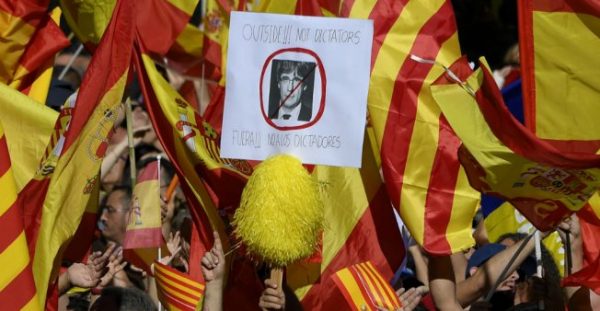
Protesters swarmed, singing and clapping, through Barcelona’s streets in a sea of red-and-yellow Spanish flags, brandishing placards reading “De Todos” (It belongs to all of us).
By lunchtime, police estimated some 300,000 anti-secessionists had flocked to the city centre, while organisers put the crowd count at 1.1 million.
Spain’s biggest political crisis in decades mounted on Friday when secessionists in the Catalan parliament voted to declare the wealthy northeastern region of some 7.5 million people an independent republic.
The central government reacted by temporarily stripping the region of its autonomy, declaring the dismissal of secessionist regional president Carles Puigdemont and his executive.
“We are all Catalonia,” proclaimed a massive banner Sunday, as marchers, young and old, chanted “Prison for Puigdemont”, and “Long live Spain, long live Europe, long live the King!”
“I am enraged about what they are doing to the country that my grandparents built,” said protester Marina Fernandez, a 19-year-old student from Girona, a separatist stronghold.
She said that in her hometown she cannot speak out for Spanish unity or “leave my house with the Spanish flag,” she told AFP.
The deputy president of the deposed Catalan government lashed out at Madrid, meanwhile, over what he called a “coup d’etat”.
“The president of the country is and will remain Carles Puigdemont,” the deposed leader’s deputy, Oriol Junqueras, wrote in Catalan newspaper El Punt Avui.
‘They are dictators’
Junqueras used the word “country” to refer to Catalonia, and signed off as the region’s “vice president”.
“We cannot recognise the coup d’etat against Catalonia, nor any of the anti-democratic decisions that the PP (Rajoy’s ruling Popular Party) is adopting by remote control from Madrid,” he wrote.
On top of firing Catalonia’s regional government, Prime Minister Mariano Rajoy dissolved its parliament and called December 21 elections for a new one.
Flor Pena, a 59-year-old originally from the northwestern autonomous region of Galicia, described the separatists’ actions as “shameful”.
“The thing to do now is to beat them at the polls,” she said.
She was part of a throng gathered near the spot where tens of thousands of people had celebrated the new “republic” with song, wine and fireworks two days earlier.
“They have made fools of us,” Miguel Angel Garcia Alcala, 70, who had travelled from the town of Rubi, 22 kilometres (14 miles) from Barcelona, told AFP.
“It is illegal what they have done… They are dictators.”
‘Viva Espana!’
The Catalan crisis was triggered by a banned independence referendum on October 1 that was shunned by many and marred by police violence.
Ines Arramadas, leader of the anti-secessionist Ciudadanos party, told journalists at the march that most Catalans wished to « recover our future ».
“The majority of Catalans feel Catalan, Spanish and European,” she said, a day after thousands of people took part in a similar march in Madrid.
Representatives of Rajoy’s conservative PP were also at Saturday’s rally, in what for some resembled the start of an election campaign.
opinion poll published in centre-right newspaper El Mundo Sunday said separatist parties would lose their majority in Catalonia’s regional parliament if elections were held today.
‘Democratic opposition’
As prosecutors prepared to file charges of rebellion against Puigdemont next week, he called Saturday for “democratic opposition” to Madrid’s decision to impose direct rule the first curtailment of regional autonomy since Francisco Franco’s 1939-75 dictatorship.
The immigration minister of Belgium, itself dealing with political tensions between French- and Flemish-speaking residents, said Sunday it could offer Puigdemont asylum.
“It’s not unrealistic, looking at the current situation,” Theo Francken, a member of the Flemish separatist N-VA party, told broadcaster VTM.
Spain’s ambassador to France, Fernando Carderera, meanwhile, said Puigdemont will be “invited to present his candidacy” for the December elections.
Roughly the size of Belgium, Catalonia accounts for about 16 percent of Spain’s population and attracts more tourists than any other region of Spain.
produces a fifth of Spain’s economic output making the region’s economy the same size as Portugal’s.
Barca vs Madrid
Before the upheaval, Catalonia enjoyed considerable autonomy, with control over education, healthcare and policing.
But while fiercely protective of their language, culture and autonomy, Catalans are divided on independence, according to polls.
Spain has the backing of the United States and allies in a secession-wary European Union still reeling from Britain’s decision to leave.
Many fear the economic impact as the standoff drags on. Some 1,700 companies have moved their legal headquarters out of Catalonia due to the tension.
Later on Sunday, Real Madrid football club, supported by Rajoy, will face Puigdemont’s favourite, Girona, in the Catalan side’s home stadium.
(AFP)

Leave a Reply
You must be logged in to post a comment.